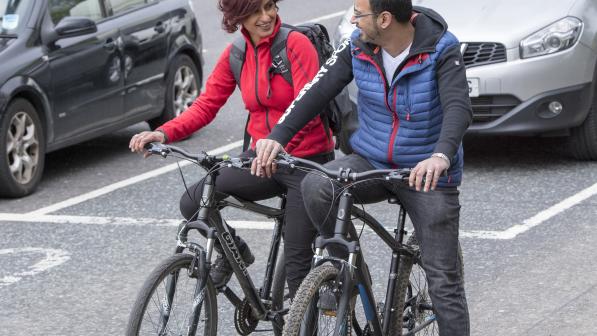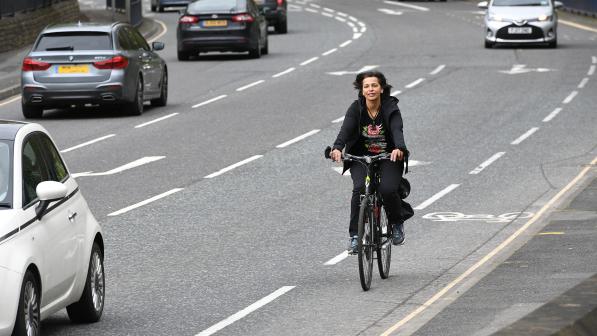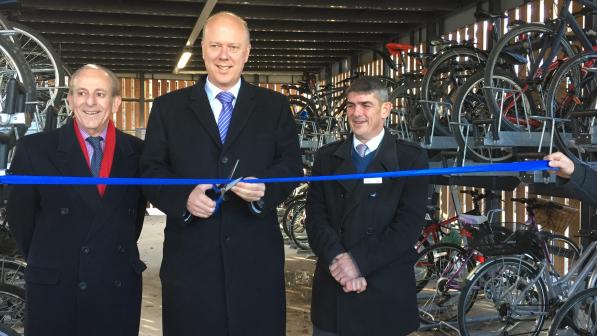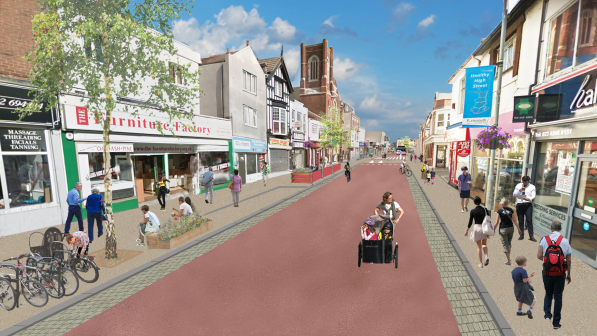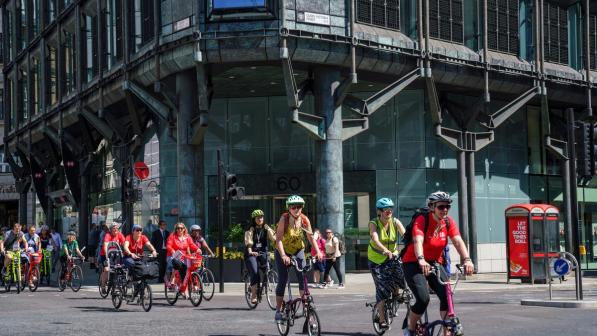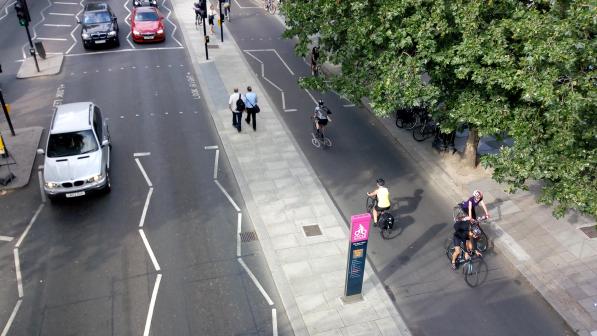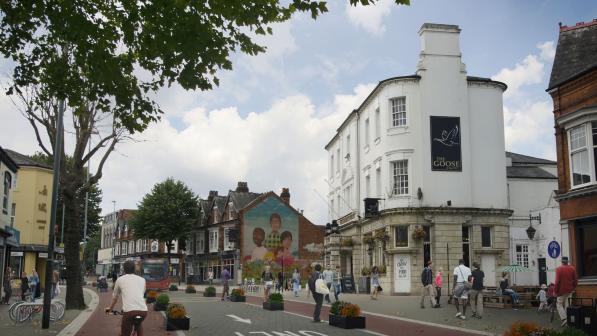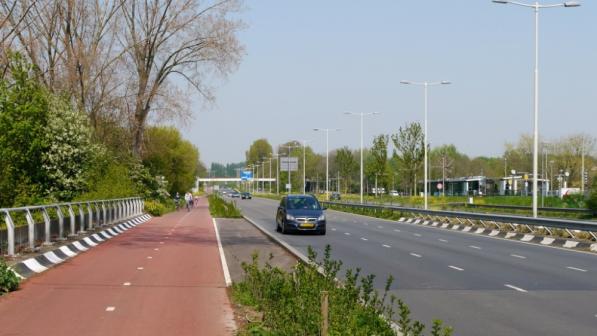Are ministers finally listening to our calls for funding for cycling?

Last year, Cycling UK launched our Funding for Waling and Cycling campaign, along with walking charity Living Streets, to strengthen the Government's Cycling and Walking Investment Strategy. You might may recall our past frustrations that this investment 'strategy' - it's painfully lacking in serious 'investment', and it's not exactly awash with 'strategy' either. So, when Chancellor Philip Hammond was planning to launch a 5-year Government-wide Spending Review last Autumn, we saw this as a huge opportunity to strengthen it.
But Brexit is affecting everything - even Cycling UK's campaigning plans and that Spending Review isn't now due to be launched this summer. And even it might only be a 3-year review, or a 1-year review. We've therefore had to keep the campaign 'simmering', rather than really turning up the heat.
To sustain the momentum, the All Party Parliamentary Cycling Group agreed to host an event in Parliament on Wednesday (30 April). As well as explaining the Funding for Cycling campaign, we wanted to brief MPs on the evidence that the Department for Transport (DfT) itself will be using as the basis for its bid for cycling and walking investment, once the Spending Review formally gets underway.
DfT has asked consultants Transport for Quality of Life (TQL) to advise them on (a) the adequacy of current funding and (b) the additional funding that will be needed from the Spending Review if the Government is to meet the aims and target set out in the CWIS. Those were:
- to double cycling, where cycling activity is measured as the estimated total number of 'cycle stages' made each year, from 0.8 billion stages in 2013 to 1.6 billion stages in 2025
- to increase walking activity, where walking activity is measured as the total number of 'walking stages' per person per year, to 300 stages per person per year in 2025
- to increase the percentage of children aged 5 to 10 that usually walk to school from 49% in 2014 to 55% in 2025.
[N.B. A "cycle stage" is a either trip made entirely by cycling, or the cycling portion of a trip made partly by other means - e.g. cycling to the station to catch a train].
Now, you might ask how come they didn't assess the funding needed to meet these aims before adopting the CWIS in 2017? But hey, it's genuinely good news that they have now commissioned this research, and even better news that they are evidently taking it really seriously.
What works: the evidence
The Transport for Quality of Life team, led by Lynn Sloman, has been gathering the evidence on the cost-effectiveness of different measures that can be taken to boost cycling and walking. These include: protected cycle lanes, local traffic restraint (e.g. schemes like London's 'Mini-Hollands'), 20mph schemes, cycle training, e-bikes... you name it, Transport for Quality of Life have been assessing the evidence and quantifying the cost-effectiveness of each of these measures, in terms of the amount of investment needed to generate one additional cycling trip.
They have also been looking at different packages of measures that could be used to reach the CWIS aims, particularly the one to double cycling stages. After all, you could just spend money in places which already have a reasonable cycling culture - places with young, predominantly white middle class populations and plenty of students - in order to get the biggest bang for your buck. Or you could spend more of it in more disadvantaged communities, where the uptake of cycling is likely to be lower in the short-term, but whose long-term health benefits might be much greater.
The choices you make affect how much money you need to spend in order to meet the Government's targets. But they also affect how well-placed the Government to continue growing cycle use in the future, given the Government's stated aim to make cycling and walking the normal choices for local journeys, or as part of a longer journey, by 2040.
Transport for Quality of Life isn't ready to publish actual spending recommendations for these different scenarios, But Lynn was able to give MPs and others an indication of the early lessons from her research.
It's worth looking at her slides to understand the full implications of these key lessons:
- To increase cycling, you need both capital and investment (i.e. you need to built good infrastructure and to promote it well through behaviour-change projects, such as cycle training and Cycling UK's Big Bike Revival or Community Club projects). Either on its own is less effective.
- Investment is more effective if it takes place over an extended time period (>10 years). Stop-start funding means that local authorities can't develop long-term programmes or retain the skills needed to deliver these.
- Competitive funding means many areas lose out. Funding for cycling needs to be available to all authorities: otherwise the good authorities build up bid-writing skills and programmes of future schemes to bid for, while the weak authorities never get to the starting line.
- Though most European cities with high cycling levels have achieved this over 40+ years, it is possible to move faster - e.g. Seville.
- European cities that have high levels of walking and cycling have 8 common features:
- Consistent long-term political support
- £10 - £35 per head annually on cycling infrastructure and services
- Continuous developments cycle networks, physically separated from traffic
- Periodic investment in expensive infrastructure to complete missing links (e.g. cycle bridges or tunnels)
- Traffic calming and speeds below 20mph on about 75% of their road networks
- Strategies to discourage car use (e.g. car parking restrictions alongside pro-cycling policies)
- Political will to take difficult decisions, e.g. on reallocating road and parking space to create great cycling routes
- Land use policies to create compact cities, not urban sprawl, so that more journeys can be made quickly by bike.
How will Funding for Cycling make a difference?
Earlier in the meeting, Cycling UK had explained the Funding for Cycling campaign and its aim to demonstrate the level of cross-party political support, both from MPs and from local authorities around the country, for investment in cycling.
We showed them our visualisations of how busy streets could be transformed in ways that wouldn't just benefit existing cyclists, or even just the would-be cyclists of the future, but everyone who stands to gain from less congested streets, pleasanter town-centres, quieter neighbourhoods and cleaner air.

Following Lynn's presentation, there was an excellent discussion about the importance of not just increasing the levels of investment, but sustaining it. After all, councils really need to know that the funding will be there next year, the following year and for several years after that, if they are really going to train staff, plan and consult on a comprehensive local cycle network plan, cost it up, prioritise it all, and put an area-wide plan into practice.

The Minister gets the message
The following day, Jesse Norman MP - the minister responsible for cycling and walking - gave evidence (starting at 10:15) to a parliamentary inquiry on Active Travel, being held by the Commons Transport Select Committee. Cycling UK has already given oral evidence along with our partners Living Streets and Sustrans, as well as making a joint written representation along with a wider range of partners, and a more detailed submission of our own. Yesterday, it was the Minister's turn to respond.
Most ministers avoid saying anything in front of a Select Committee that might get them into trouble!. So it was heartening that Jesse Norman seemed prepared to stuck his neck out, even if a little tentatively.
The key question was around funding. In our own testimony to the Committee, I and my counterparts from Living Streets and Sustrans had pointed to evidence (which also comes from TQL's work) that the Government is currently on course only to get one-third of the way to its cycling target. So, when the Minister was asked whether his Department was on course to meet its CWIS targets, his response was interesting.
Jesse Norman said he thought it would meet the walking to school target, but then added: “[Meeting the cycle use target] will require major further intervention if we’re going to get there. I’m perfectly persuaded that we can hit it, and I am very resolute that we should do whatever we can to hit it, but it is going to require very significantly more intervention.”
He then talked about how annual spending on cycling and walking had increased from £2.50 per person in 2010 to over £7 now, but added that: “We’re going to need to significantly, dramatically – potentially double or more that rate of intervention if we’re going to hit that.”
An MP then asked him: "So, £15 per head?"
He said we could debate the exact numbers and anyway he didn't want to get in trouble with the Treasury, but: “My ambition is well up in those levels. We’ve got to get very serious about it.”
Later in the session, he was asked about funding again. He reiterated the growth in funding since 2010, to over £7 per person in 2018, adding that:
"I think I’ve said that we aspire to maintain that kind of rate of growth. And I certainly want to see us at double that kind of level – and we’re going to need to hit double that kind of level if we’re going to hit the cycling stages target that we’ve got and I think that is realistic and I think that Government ought to be committing itself to.”
Now, £15 is still below (though not vastly below) what Cycling UK and its allies want to see in year 1 of the next Cycling and Walking Investment Strategy - and it's less than half of what we think will be needed by year 5. We have called for investment in cycling and walking to reach 5% of transport spending as soon as possible, rising to 10% over the next 5 years. Based on 2017/18 spending levels, that would equate to spending in year 1 of around £17 per person outside London, rising to around £34 in year 5.
Still, at least Jesse Norman is showing signs of having the ambition at least to get to the baseline of a properly-funded CWIS!
A new climate of opinion
There was another interesting exchange early in the evidence session, when Jesse Norman was asked about cross-departmental collaboration on maximising the health, environmental and other benefits of cycling. What support did he have from ministers in other departments? He said that there was good cross-departmental support at the junior ministerial level, name-checking the departments for Health (DHSC), for Housing, Communities and Local Government (MHCLG), and for digital, culture, media and sport (DCMS). He then added that this support is “seeping into the cabinet”, but then added that it “falls short of the full mind-change I’d like to see.”
So it was heartening to see what happened in the Commons chamber the following day, during the monthly session of oral questions to transport ministers. This took place on the morning that the Committee on Climate Change (CCC, the Government's statutory advisors on meeting its legal obligations under the Climate Change Act 2008) published a report calling for a new UK target to reach 'net zero' greenhouse gas emissions by 2050. It also came one day after Parliament had backed a motion declaring a 'climate emergency', as called for by Extinction Rebellion, the School Climate Strikes and others.
Sarah Wollaston MP (the chair of the Commons Health Select Committee, and a keen advocate of cycling) asked an excellent question, based on what she had heard of Lynn Sloman's evidence at the APPCG meeting two days earlier. But the really interesting bit came later, when Transport Secretary Chris Grayling was asked a question by his Labour Shadow, Andy McDonald.
McDonald noted that the Committee on Climate Change had pointed the finger at Transport as the UK's economic sector that is now the largest emitter of greenhouse gases. Was Grayling proud of his Department’s record, he asked, or did he recognise the need for a rethink? In response, Grayling said he was proud to be part of a Government that has made excellent progress in decarbonising the UKs emissions, before turning to his own Department’s actions to promote electric vehicles.
If they look at the work that my hon. Friend the Member for Hereford and South Herefordshire is doing to promote cycling and walking, they will see that we are spending more than previous Governments have done.
Chris Grayling, Transport Secretary
Then, remembering another example of good practice he could cite, he pointed to Jesse Norman sat next to him, and said: “If they look at the work that my hon. Friend the Member for Hereford and South Herefordshire is doing to promote cycling and walking, they will see that we are spending more than previous Governments have done. There is, of course, much more to do, but we are working harder than any previous Government to deliver real change.”
In short, Jesse Norman has now had very public backing from his Secretary of State for his efforts, and thus hopefully for his future aspirations too.
Strengthening political will
Despite the fact that our campaign has been 'simmering' rather than being brought up to 'full boil', Jesse Norman MP has already received over 200 letters and emails from MPs in response to our campaign, and plenty more from leading Councillors. The message is getting through that large numbers of MPs and Councillors are really keen to see strengthened investment in cycling and walking, all around the country.
We need to keep up a steady flow of MPs, helping Jesse Norman to demonstrate to the Treasury not only that there is really good evidence of the cost-effectiveness of investing in cycling and walking, but also that it is politically popular in constituencies all over the country.
If your MP hasn't written to him yet, please urge them to do so - take action now!
